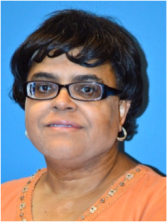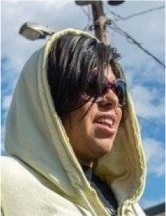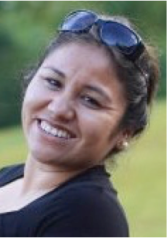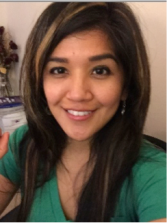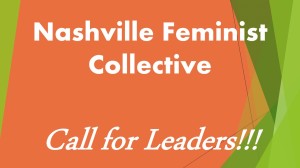1 in 3 American women will get an abortion before the age of 45 http://www.1in3campaign.org/en
Abortion stigma is a shared belief that abortion is morally wrong and/or socially unacceptable. Abortion stigma has disastrous consequences. People seeking abortions are bullied, shamed, marginalized, and sometimes even prevented by law or intimidation from seeking safe health care services. Abortion providers are harassed, dehumanized and targeted by regulation and anti-abortion advocates. Stigma leads to the social, medical, and legal marginalization of abortion care around the world and is a barrier to access to high quality, safe abortion care. http://seachangeprogram.org/whats-new
In 2011, 16,720 women obtained abortions in Tennessee, producing a rate of 13.1 abortions per 1,000 women of reproductive age. The rate decreased 15% since 2008, when it was 15.3 abortions per 1,000 women 15-44. Abortions in Tennessee represent 1.6% of all abortions in the United States. (Source: Guttmacher Institute)
In 2011, 113,900 TN women became pregnant; 70% of these pregnancies resulted in live births, 15% in induced abortion. This is below the national average which was 67% live births and 18% in abortions. (Source: Guttmacher Institute)
In Tennessee, the following restrictions on abortion were in effect prior to Amendment 1 as of November 1, 2014:
- Health plans offered in the state’s Affordable Care Act health exchange may not provide coverage for abortion.
- Public/government funding is available for abortion only in cases of life endangerment, rape or incest.
- The use of telemedicine or the remote prescription of abortion medication is prohibited, i.e. abortion must be performed in the physical presence of the woman.
- At least one parent of a minor must consent before an abortion is provided.
- Abortion facilities must clearly post signs in 40 point Ariel font indicating that a woman cannot be “pressured, forced or coerced” to have an abortion against her will (TN Freedom from Coercion Act, passed 2010) http://www.capitol.tn.gov/Bills/106/Bill/SB3812.pdf
- Only a physician licensed or certified by the state, not a nurse or physician’s assistant, may perform an abortion.
- The Life Defense Act of 2012 requires clinics to report detailed demographic data on doctors and patients to the TN state government. http://data.rhrealitycheck.org/law/tennessee-life-defense-act-of-2012-hb-3808/
- Life Defense Act of 2012 requires doctors performing abortions at clinics to have hospital admitting privileges no further than an adjacent county away.
In 2015, the following bills (read more here) were passed affecting abortion:
- Pregnant people seeking an abortion in TN will now have to make two trips to a clinic, waiting 48 hours after getting in-person counseling from a doctor before being able to return for the procedure.
- All clinics performing more than 50 surgical abortions each year must be regulated as outpatient surgery centers — a law that has forced clinic closures in other states. The measure could jeopardize the operations of 2 of TN’s 7 abortion providers that are not already regulated under those Department of Health rules. (This law is being challenged in the courts, see here.)
- A physician performing an abortion is now required to tell women and pregnant people the following or risk felony or misdemeanor arrest or the revocation of medical license (what they are calling “informed consent”):
-
The gestational age of the fetus.
That “numerous public and private agencies and services are available to assist her during her pregnancy and after the birth of her child, if she chooses not to have the abortion.” Physicians are required to provide a list of those agencies upon request.
A description of the abortion procedure.
The medical benefits, risks or both of undergoing an abortion or continuing pregnancy to term.
That if a pregnancy has reached 24 weeks of gestation or more, and a viable child is born during the course of an abortion, the physician has a legal obligation to take steps to preserve the health and life of the child.
In 2016, the following bills were passed affecting abortion:
- Remains of unborn children cannot be bought or sold following an abortion. Requires informed consent in writing by a woman prior to an abortion specific to the disposition / disposal of her unborn child’s body.
For a full list of recent years’ legislation, see TN Right to Life.
As of Dec 1, 2015 there were 7 abortion clinics in Tennessee:
- Planned Parenthood – Nashville
- The Women’s Center – Nashville
- Bristol Regional Women’s Center – Bristol, TN
- Knoxville Center for Reproductive Health – Knoxville, TN
- Planned Parenthood – Knoxville, TN*
- CHOICES Memphis Center for Reproductive Health – Memphis, TN
- Planned Parenthood – Memphis, TN
*The Knoxville Planned Parenthood doesn’t do surgical abortions, but they do offer induced/medical abortions i.e. abortion induced with medication, which is most effective for first trimester abortions (9 weeks or earlier).
There are no clinics in Tennessee that perform abortions past 16 weeks of gestation.
3 of the 7 clinics are run by Planned Parenthood. The Bristol Regional Women’s Center and The Women’s Center in Nashville are run by the same provider and are not clinics, just doctors offices, which makes them more vulnerable to regulation. CHOICES is an independently run nonprofit.
4 of the 6 abortion clinics in the state that provide surgical abortions currently meet the states’s new ambulatory surgical center licensing standards (2015 legislation). Knoxville’s Planned Parenthood only provides medication abortion and, therefore, does not have to be licensed as an ambulatory surgical center. The Bristol and Nashville clinics are the two remaining clinics that provide surgical abortions and are not licensed as ambulatory surgical centers. There is a currently a lawsuit to fight this requirement http://www.womenshealthpolicyreport.org/articles/tenn-lawsuits.html
The total number of abortion providers in TN is down from 14 in 2011. http://www.guttmacher.org/pubs/sfaa/pdf/tennessee.pdf
In 2011, 96% of Tennessee counties had no abortion clinic. 63% of Tennessee women lived in these counties. http://www.guttmacher.org/pubs/sfaa/pdf/tennessee.pdf
How to self induce an abortion with the abortion pill and what to expect, see: Women on Waves. This is not legal in Tennessee. If you self induce and you need to seek medical assistance due to complications from the procedure, do not tell anyone that you tried to induce an abortion or you could be subject to criminal charges of attempted murder or murder.
pregnancies are calculated from the date of your last period, meaning on average 2 weeks of pre-conception time (in which there was factually no pregnancy) are included in the count. Everyone needs to be advised to never give a health provider their LMP (last menstrual period) but rather an estimated conception date and vague references to periods being irregular. This buys vital time for those deciding whether to keep a pregnancy, and protects those who do want to carry to term from unnecessary induced labor.
Tennessee provides funding to pregnancy resource centers (also called “abortion alternatives” or “crisis pregnancy centers”) through a Choose Life specialty license plate program. A license plate supporting women’s right to choose is not available. http://www.tn.gov/revenue/vehicle/licenseplates/miscellaneous/miscellaneous.shtml and http://www.nytimes.com/2009/04/28/us/28bar.html and has been opposed by the TN legislature in the past.
If you are considering an abortion, do not visit a crisis pregnancy resource center. They will not give you accurate information about abortion services and will try to talk you into choosing another option. They may also lie to you about the risks of abortion in order to dissuade you from obtaining one. (Source: NARAL) Moreover, they will try and delay you. Their delay tactics cost precious weeks of decision making. If you wait too long, you will not be able to access an abortion legally in TN because abortion is illegal after viability (20-24 weeks).
Pregnancies are calculated from the date of your last period, meaning on average 2 weeks of pre-conception time (in which there was factually no pregnancy) are included in the count. Everyone needs to be advised to never give a health provider their LMP (last menstrual period) but rather an estimated conception date and vague references to periods being irregular. This buys vital time for those deciding whether to keep a pregnancy, and protects those who do want to carry to term from unnecessary induced labor.
The risk of death associated with childbirth is approximately 14 times higher than that with abortion in the U.S. The pregnancy-associated mortality rate among women who delivered live babies was 8.8 deaths per 100,000 live births. The mortality rate related to induced abortion was 0.6 deaths per 100,000 abortions. (Source: US National Institutes of Health)
An abortion-related death is defined as a death resulting from a direct complication of an abortion (legal or illegal), an indirect complication caused by a chain of events initiated by an abortion, or an aggravation of a preexisting condition by the physiologic or psychological effects of abortion.

(Source: CDC; 2009 is most recent data available)
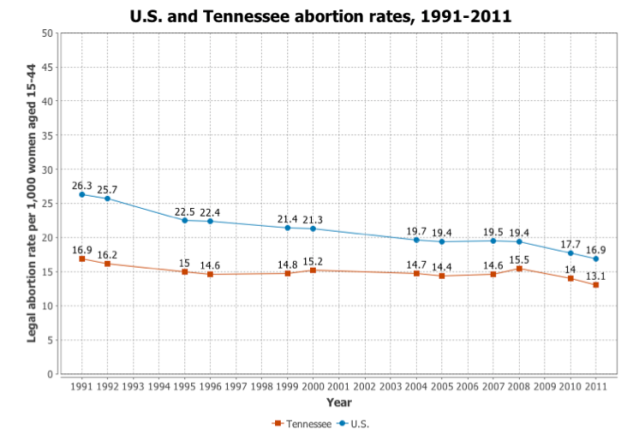 (Source: Guttmacher Institute)
(Source: Guttmacher Institute)
63% of U.S. adults say they would not like to see the Supreme Court completely overturn Roe v. Wade, while 29% want to see the ruling overturned. These figures have remained relatively stable for more than 20 years. (Source: Pew)
62% of U.S. adults know that Roe v. Wade was a decision about abortion, but among adults under 30 years old, only 44% are aware of this fact. Younger adults also are less likely to view abortion as an important issue: 62% of Americans ages 18-29 say it is “not that important” compared with other issues, while 53% of adults overall say this. (Source: Pew)
In the mid-1970s, when Gallup started polling on the issue, adults aged 18 to 29 and 30 to 49 were the most supportive of legal abortion under any circumstances, and those 65 and older the least, with 50- to 64-year-olds falling in between. That pattern continued through the late 1990s. Since 2000, however, adults aged 18 to 29 are less supportive of abortion than any age group except those over 65. (Source: Gallup)
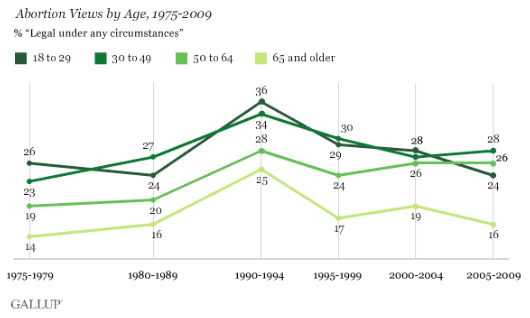
From 2011 to 2013, 205 abortion restrictions were enacted, while only 189 were enacted during the entire previous decade put together (2001-2010). (Source: Guttmacher)
Abortions represent 3% of total services provided by Planned Parenthood. Planned Parenthood does receive federal funding for some of its health services, but federal money has not been used for abortions at Planned Parenthood or anywhere else since the Hyde Amendment passed in 1976. http://www.factcheck.org/2011/04/planned-parenthood
http://www.fundabortionnow.org/learn/hyde
Informed consent is mandated by statute or case law in all 50 states. Informed consent is the concept that individuals have a right to receive relevant, accurate and unbiased information prior to receiving medical care so they can make sound decisions regarding treatment. States have been enacting “informed consent” mandates specific to abortion (and will likely do so in TN). Although most of the information in the materials about abortion conforms to recent scientific findings and the principles of informed consent, some content—specifically, that which is related to breast cancer, psychological impact, fetal pain and referrals for additional care—is either misleading or altogether incorrect. (Source: Guttmacher)
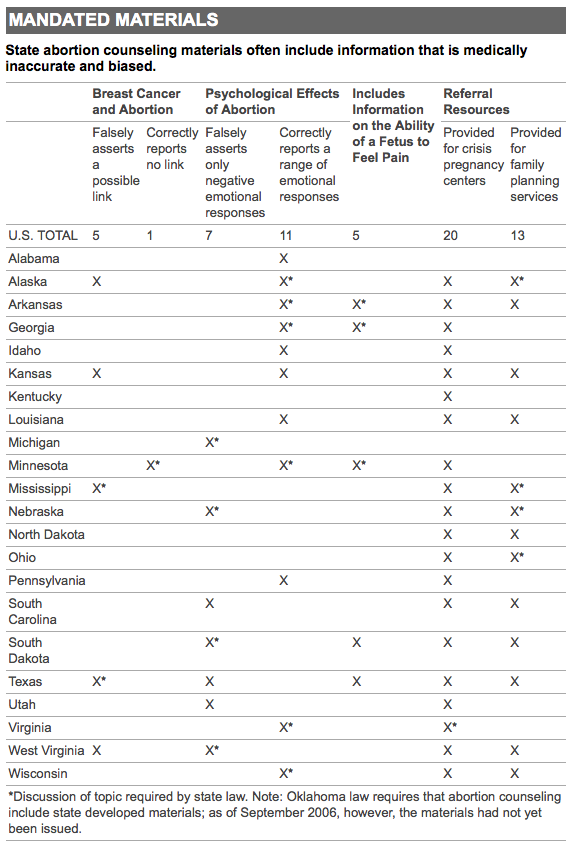
Targeted Regulation of Abortion Providers (TRAP) laws by state chart, below (source: Guttmacher)

Overview of state abortion law chart (source: Guttmacher), below
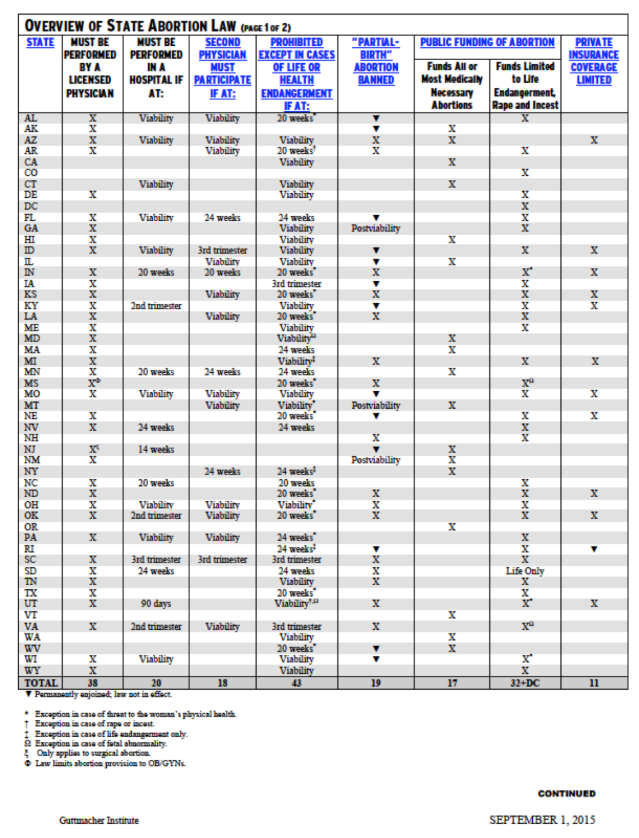
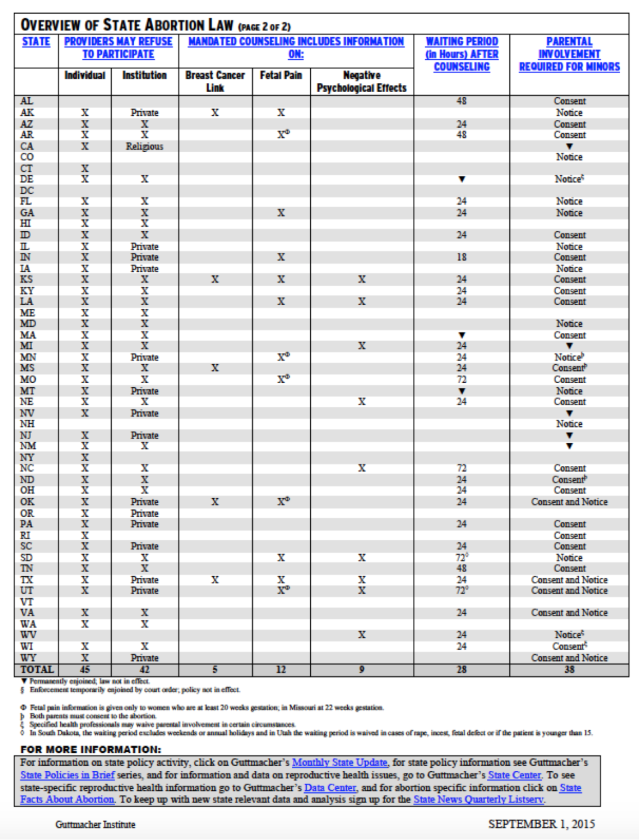
Overview of counseling and waiting period requirements by state chart, below (source: Guttmacher)
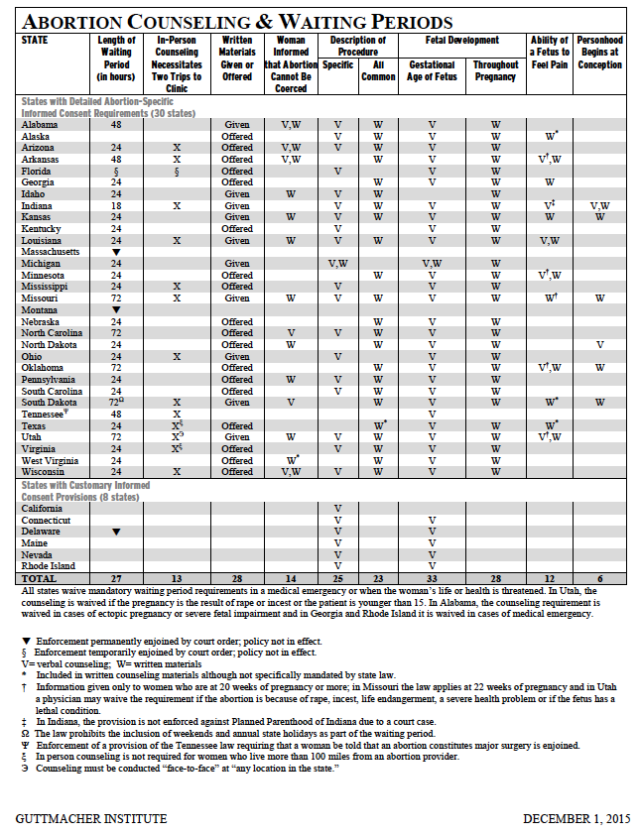
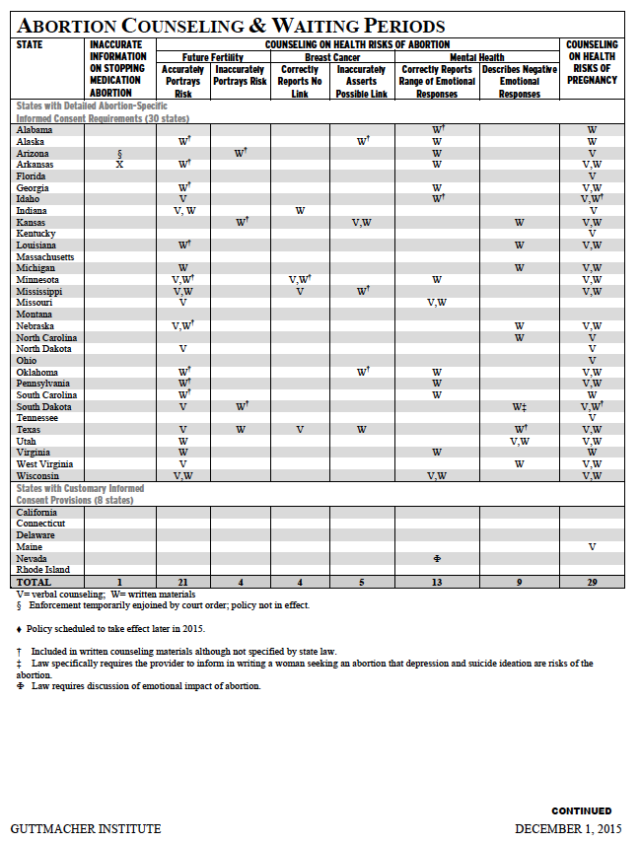
Read more:
4 Major Lies About Abortion That Have Made Their Way Into Our Laws Nov 13, 2014 http://thinkprogress.org/health/2014/11/13/3592087/major-abortion-lies-laws and http://time.com/3582434/6-abortion-myths/
For a Christian blog re: what the Bible says about when a fetus becomes a living being, see: http://www.thechristianleftblog.org/tcl-blog/the-bible-tells-us-when-a-fetus-becomes-a-living-being
11 Arguments Against Abortion Access, Debunked http://www.bustle.com/articles/17141-how-to-argue-pro-choice-11-arguments-against-abortion-access-debunked
Catholic religious restrictions cause hospitals to commit malpractice by refusing to perform medically necessary abortions http://valerietarico.com/2013/06/06/do-catholic-restrictions-on-healthcare-force-doctors-to-commit-medical-malpractice/
http://www.guttmacher.org/statecenter/tennessee.html
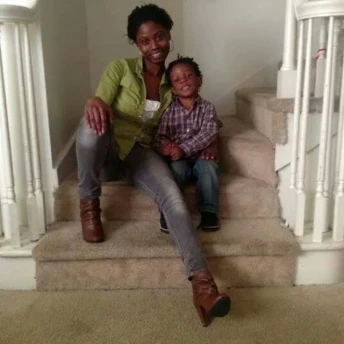

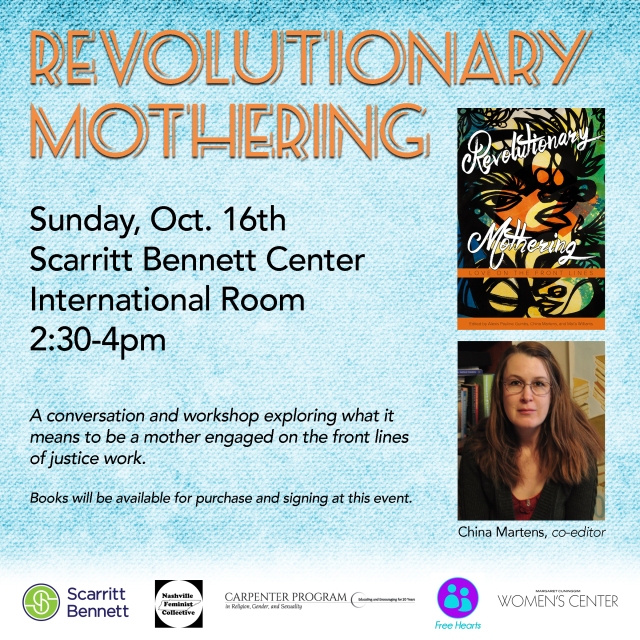
 ctive is a partner of the Tennessee Stories Project (TSP). The TSP is an effort to reduce abortion stigma by creating a space for those in Tennessee who have had an abortion to share their stories. Too often, conversations about abortion are dominated by the voices of those who seek to shame and intimidate. The goal of TSP is to promote a culture of compassion and to strip away the stigma associated with abortion by lifting up
ctive is a partner of the Tennessee Stories Project (TSP). The TSP is an effort to reduce abortion stigma by creating a space for those in Tennessee who have had an abortion to share their stories. Too often, conversations about abortion are dominated by the voices of those who seek to shame and intimidate. The goal of TSP is to promote a culture of compassion and to strip away the stigma associated with abortion by lifting up 
 (Source:
(Source: 








